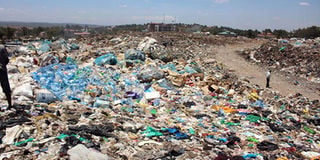Environmental Conservation and the Big Four

Plastic waste at Ngong Dumpsite in Kajiado County on March 17, 2019. PHOTO | FILE | NATION MEDIA GROUP
What you need to know:
Officially Kenya annually produces about three million tonnes of waste. Only eight percent is recycled.
- With government support, we have the potential to be one of the world’s pioneering countries in terms of climate innovation.
This past year the world has witnessed an increasing awareness of the environmental crisis that threatens the future of the globe. Politically involved young people such as Swedish climate activist Greta Thunberg have raised the issue in global forums and called on experienced leaders to take responsibility for our actions and to protect the environment.
REPERCUSSIONS
Like many lower income countries, Kenya disproportionately suffers from the repercussions of climate change. This is due in part to inadequate infrastructure and a need for better systems to counter extreme weather conditions. With all of our national parks contributing significantly to national revenue via the tourist industry, Kenya has much at stake when it comes to saving the planet.
President Kenyatta already recognised this and began by implementing his plastic bag ban in 2017. Plastic bags are one of the world’s foremost polluters and cause great damage to the ocean ecosystem. But despite this awareness of climate change, Kenyans remain reluctant to use products labelled as eco-friendly or recycled. They often adhere to the misconception that these products are lower quality than new ones - without considering the environmental repercussions.
WASTE BUSINESS
Two other major items on the top of Kenya’s agenda are deeply intertwined with the environment - increasing manufacturing and adequate housing. In order to come up with good solutions for each of these challenges, it would be a good idea to think about how they affect one another, and how advances in one area can complement changes in another.
This seems to be what environmental scientists Hope Mwanake and Kevin Mureithi had in mind when they founded their company Eco Blocks and Tiles in 2016. The Gilgil based duo, who ran a waste collection service, have noticed for many years now the mountains of plastic waste surrounding their town. Landfills were full of discarded plastic bottles and buckets, thrown by residents, businesses, schools and hotels. All of this plastic was simply taking up space without utility.
MORE DURABLE
They decided that something needed to change. As Mwanake said, "We wanted to do something with all this plastic waste, and after a lot of brainstorming, research and experimenting, we came up with a value-added product with market demand that would also help to reduce all this plastic in the environment."
Eco Blocks and Tiles is the first company in Kenya to repurpose discarded plastic and glass waste for the manufacturing of roof tiles and other essential construction materials. The tiles they create are actually lighter and more durable than concrete tiles, which are usually used. They are less porous than concrete and remarkably enough have similar costs. Each ecotile costs Sh 850 - the same as a concrete tile. Moreover, according to Mureithi’s research, a family can save up to 40 per cent on wood costs when using eco tiles, thereby reducing Kenya’s deforestation levels.
VISIONARY GOAL
A typical three bedroom home needs between 1,000 and 2,000 tiles. Since production began in 2018, the company has produced more than 75,000 tiles for 30 buildings, and recycled 56 tonnes of plastic waste in the process. This is only the beginning.
Eco Blocks and Tiles is supported by the government as part of its effort to reduce carbon emissions while still raising the bar in the manufacturing industry.
The government has committed to net-zero carbon buildings by 2050 - this is a visionary goal that must be aided by creative entrepreneurs in the private sector if it is to be achieved.
Out-of-the-box thinking is exactly what is needed to produce more affordable homes - as part of the Big Four Agenda - as the population grows. More cultural acceptance for recycled and eco products is needed to encourage other scientist entrepreneurs like Mwanake and Mureithi to come up with environmentally friendly solutions to our biggest challenges.
INNOVATION
Officially Kenya annually produces about three million tonnes of waste. Only eight per cent is recycled. With government support for green business initiatives that contribute to our development goals, we have the potential to be one of the world’s pioneering countries in terms of climate innovation.
In fact, after the implementation of the plastic bag ban, we already became pioneers. Let us reduce waste and keep that momentum going. While many European countries have activists who talk, we have doers. Both of these roles are essential to the global conservation struggle, and Kenya is no longer taking a back seat in terms of universal leadership.
Ms Benyawa is a freelance journalist. [email protected]





